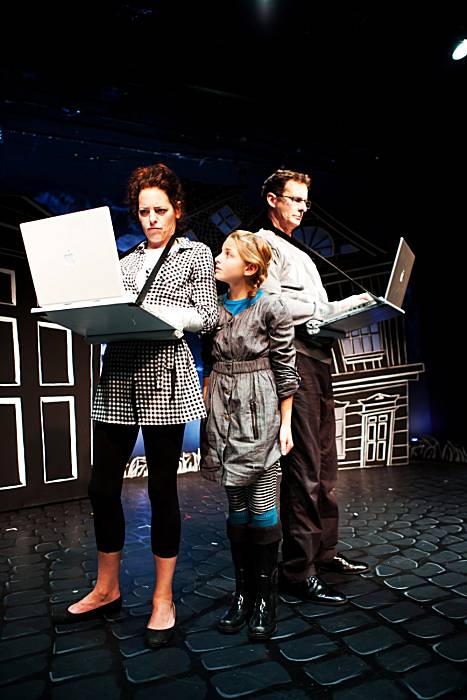A School Play
November 22, 2010

SF Playhouse is a company in San Francisco that is remarkable for the slickness of its output. The organization's prolific productions usually belie what most people normally think of as "black box theatre": The actors are among the best in the Bay Area, the sets and lights are always gorgeous and the programming is often engaging and sometimes risky.
The company's latest production, Coraline, is different though -- though sweet and festive in its own way, it feels like a school play.
It's hard to pin down why this is the case exactly and having thought about it, whether the aesthetic (if it is indeed intended) is good or bad.
The school playishness of Coraline doesn't have anything to do with the fact that the protagonist, a girl who goes through a mysterious door in her house and enters a surreal parallel universe complete with scary parents and a talking cat, is played by a very young actress. Maya Donato brings a great deal of sensitivity and humor to the character.
David Greenspan's no-nonsense adaptation of Neil Gaiman's children's novel and Stephin Merritt's delicate score for piano, prepared piano and toy piano may have something to do with the issue, however. Having composed most of this blog post, I just read Robert Hurwitt's review in The Chronicle and I think he's right when he says: "Greenspan's make-believe approach undercuts the tale's suspense and tends to make good actors look like amateurs. Merritt's inventive but cerebral score - for toy and prepared pianos - works against any emotional connection with Coraline's plight in the alternative world beyond that mysterious door."
I wonder whether the amateurish sensation also has something to do with the fact that SF Playhouse's space is really too small for this larger-than-life musical? The intimacy of the space is normally one of the company's greatest assets. But in this case, there's not enough distance from the pop-up book buildings that make up the set. They look especially flimsy and tinny. There's something also jejeune about some of the staging ideas, such as the scene in which Stacy Ross as the Jekyll and Hyde-like mother figure falls down a well. The cast members pick up a large disc sitting on top of the well and pull it over the actress' body so that it appears as if she's falling. Except that it doesn't. All I could think of as I watched Stacy Ross wave her arms about in the middle of the disc is my childhood hooplah games.



0 Comments:
Post a Comment
<< Home